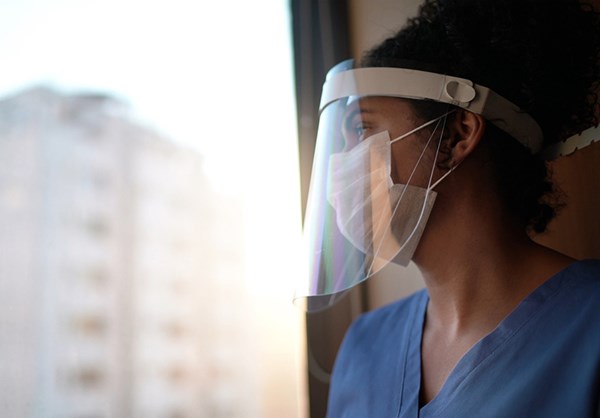The toothless-ness of the old Haitian lady in 1A, how much she looked like my Ba.
How I didn't have the time to talk to her properly by using the telephone Creole translator, and was now, 2 hours past the end of my shift, trying to make up for it by getting her on a bedpan and changing her clothes. How her CPAP mask wouldn't fit; how much she hated it; how much I hated myself for not having a better size for her because we had used up all the small ones that day. How guilty I felt for having decided to give the one available BiPAP machine to a sicker lady in a different room who kept taking her mask off anyway. How she looked surprised when a large tear fell onto her wrist, and how she didn’t believe it when I said "allergies."
How I knew she'd die in a few days.
How tight and squashed the lady in 1B looked, her face entirely surrendered to the BIPAP mask. She was on a PEEP of 20 now. DNR/DNI. She was sitting on her deathbed and she knew it. She had been on it for 3 days and was not going to come off it.
How she desaturated every time her mask was off even for a few seconds, but because she was desperately thirsty, I'd hold a bottle to her mouth, then rapidly tighten the mask between sips, always urging her to drink fast so she didn't tank her SpO2. I had done it every few hours for the past 3 shifts. She'd drink the water like a dying puppy until she couldn't breathe anymore because her saturation would drop to 70%.
She had called me "nurse" every single time, and while that stopped bothering me years ago, this time, on shift 7/7 in a row, sweating in PPE in a cramped space, 2 hours after my shift was over, I felt slightly irritable and said, "I'm not your nurse, I'm your doctor." I put the mask back on and her saturation went back up to 91%. She was still catching her breath. I wiped the sweat off her face and began to walk away. I heard a gush of air as she shifted the mask again slightly to say something. I turned around, inquiringly. She was saying, thank you, doctor.
She will continue to choose between dying of thirst and dying from not breathing, always racing to finish a small bottle of water before her sat drops. She hasn't been able to finish a full 30 mL bottle yet.
She will be dead tomorrow.
How the mentally disabled, childlike 40-year-old we admitted for a non-COVID emergency flailed his hands about when I tried to restrain him from continuing to eat his own feces. How nobody wanted to touch him, so they got my attending and me to deal with it. How he gulped down the water hungrily as I tried to flush the feces out of his mouth with water and suction, like a dentist's nightmare. How my attending, a celebrated Iraq war emergency physician featured in The NY Times, helped me clean this patient's soiled face, torso, buttocks, genitalia. How the patient still kept reaching for his mouth regardless. How I felt a gripping loss of words when I saw how caked with stool his nails still were despite my cleaning them so meticulously. He didn't have pneumonia, but the group home won't take him back, and he is entirely vulnerable, dependent on the world to keep him safe. He will likely get sick here. He may live, but he has nowhere to go.
They may have had full lives with love and care and food and jokes and chin hairs that their grandchildren plucked out. They will have none of that when they die. They will only have someone like me—a guilty-looking resident standing over them, pulling out a phone to call the exact time of their death.
Except the 40-year old. He will not die alone, because even though all he has is us – he has us.



